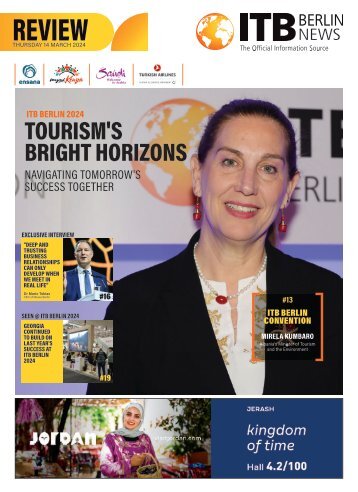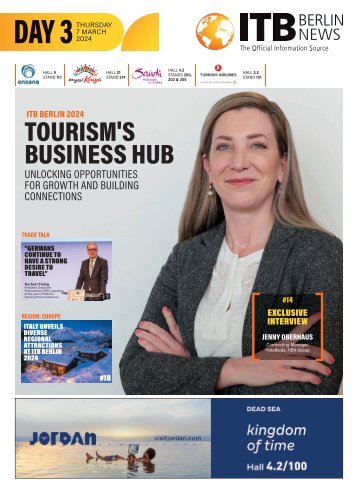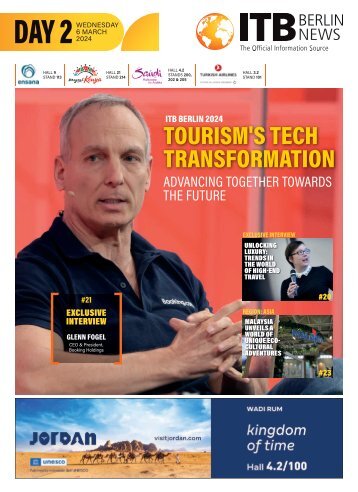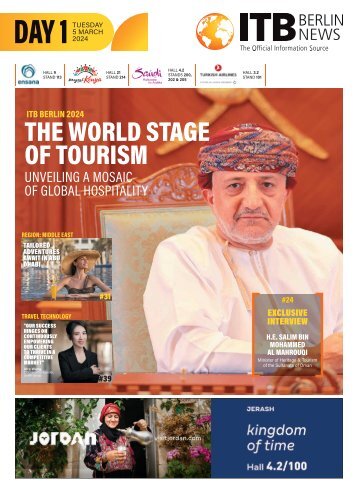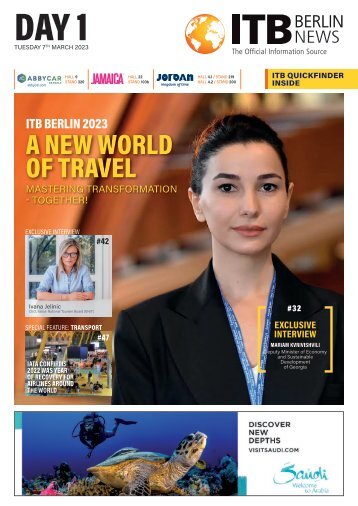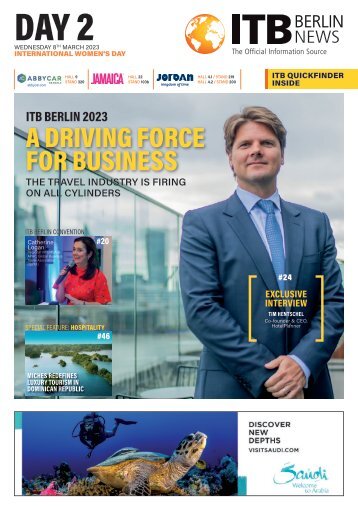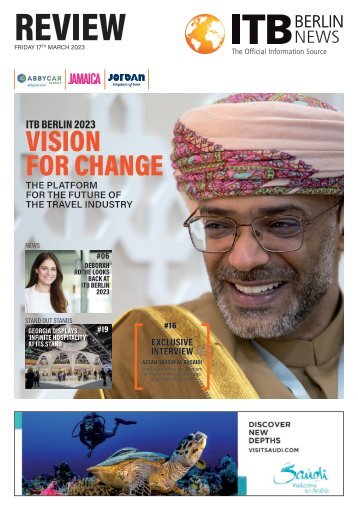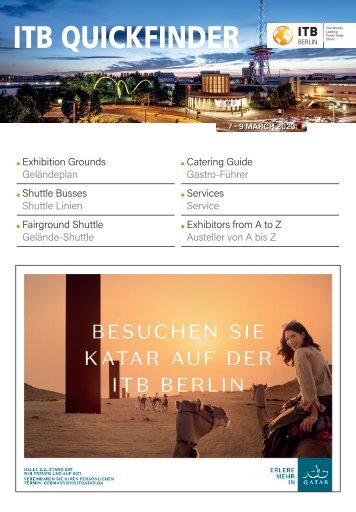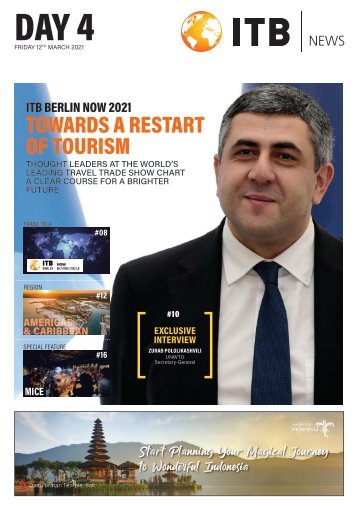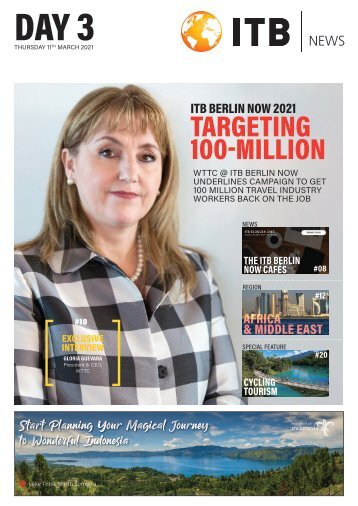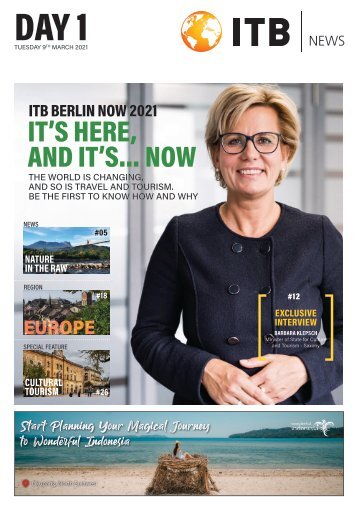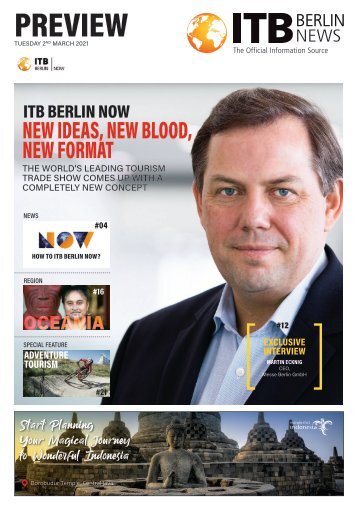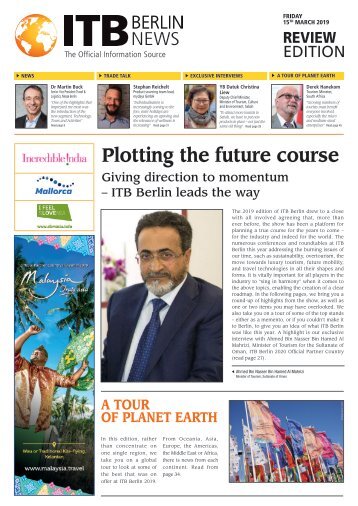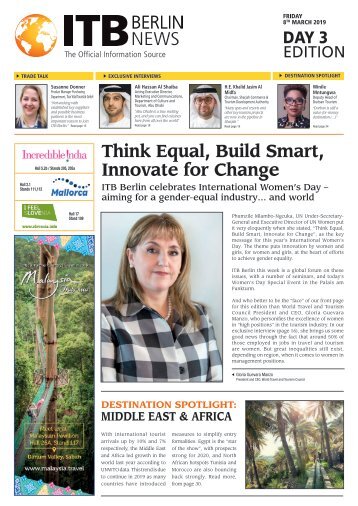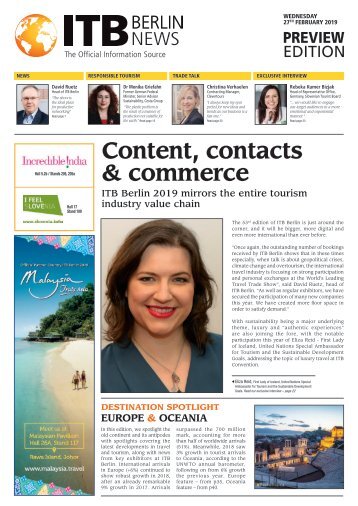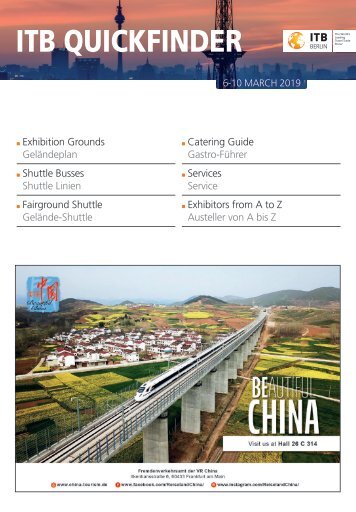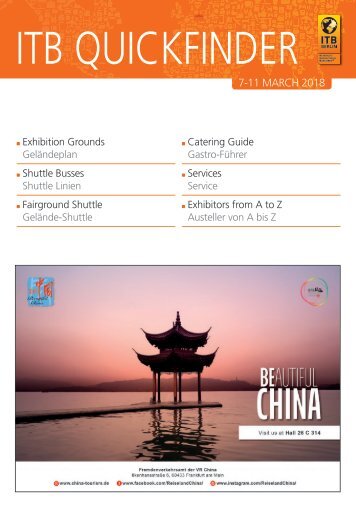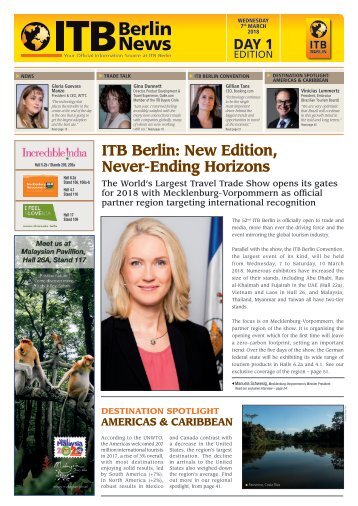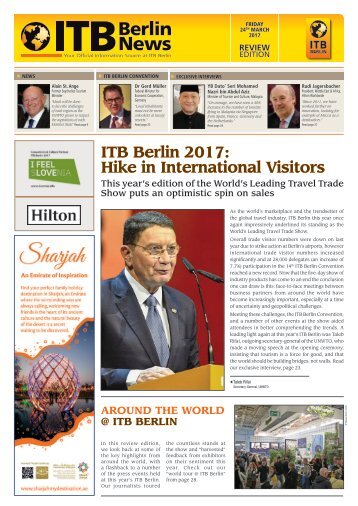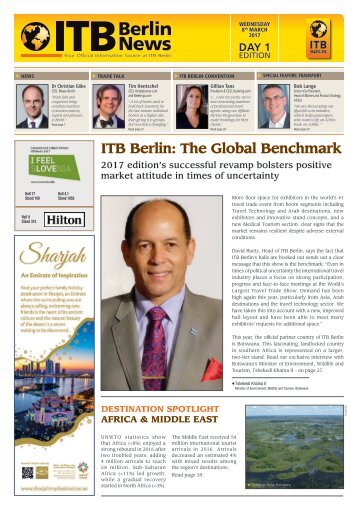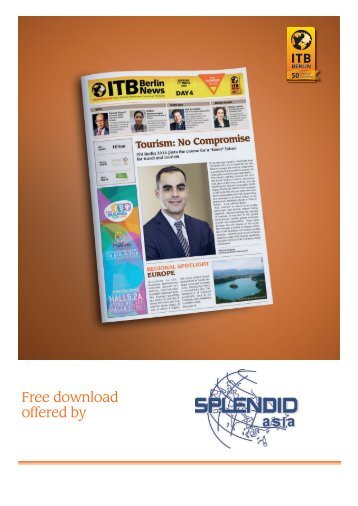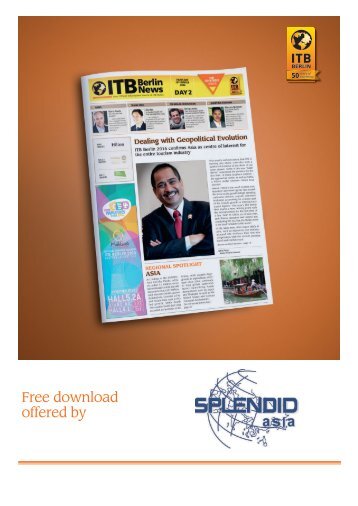
ITB Berlin News Preview Edition
- Text
- Berlin
- Tourism
- Destination
- Luxury
- February
- Global
- Marketing
- Hotels
- Convention
- Pacific
- Www.cleverdis.com
26 SPECIAL FEATURE YOUTH
26 SPECIAL FEATURE YOUTH TRAVEL The Evolving Youth Travel Market New trends revealed thanks to updated research by WYSE © DR The potential of the market for youth travel continues to grow and evolve, and this year at ITB Berlin, WYSE, the World Youth Student and Educational Travel organisation, will be lobbying governments and tourism authorities for greater recognition of the sector. We asked the organisation’s Director General, David Chapman, just how important this market is at the moment… David Chapman Director General, WYSE The value of youth travel in 2012 stood at 3 billion and the estimates for 2013 are about an increase of 5 to 8%. According to the UNWTO, youth travellers account for nearly 20% of international arrivals across the world, so it’s a huge marketplace. We aim to represent the value of these travellers to all the people involved in tourism so that the sector is not overlooked and so people realise that this is the foundation of travel for the future. Our data shows quite clearly that people who go to a destination as a young traveller – perhaps in their late teens or early 20s – WE’VE SEEN A GROWTH IN THE IMPORTANCE OF THE FLASH PACKER - THE CASH RICH, TIME POOR YOUNG TRAVELLER. will return later in life, either with a partner or a family, or even in retirement years… but most people go back to destination they went to in younger years. The New Horizons III study by WYSE, published a few months ago, is a highly detailed new look at this increasingly interesting sector. What groundswell trends were uncovered by this study? The new study really helps us to show that the youth traveller is travelling as much as ever, and the growth in youth travel is very continuous. Indeed, youth travel has grown more rapidly than traditional travel. We also know that when the economy has slowed and jobs are harder to obtain, young people tend to travel; so the industry has a degree of resistance to recession over the more traditional tourism markets. We have seen huge growth in the use of social media and technology in researching and planning as well as in booking, and there has been huge growth in the number of digital sources that are consulted prior to booking a trip. We’ve seen more and more elements of a trip being booked online. Particularly accommodation is now being booked via mobile devices - almost one night to the next! Between 2007 and 2012 there has been about 40% growth in the use of hostel booking applications for reserving the next leg of one’s accommodation. Low cost carriers have grown significantly again at the number of people using low-cost carriers have grown as the availability of low cost fares has increased dramatically. The other factor that is interesting is the resistance to “problems” in an area because of the availability of information about the destination, even if that destination has some type of problem. If we take the case in point of Greece two years ago, the country was being portrayed as having enormous civil unrest, but in actual fact that was not the case and the young traveller was able to research and find out exactly what was happening. They are happy to travel to an area if they are able to gain sufficient information about how safe it is and whether they can avoid any trouble hotspots. It’s important for them to have access to Wi-Fi, so they can talk about what’s happening in a destination. This is the cheapest and one of the most effective methods to communicate how good a destination is. For a young traveller, their highest reference points for any destination are friends and family. There seems to be a change in travel “style” as well… Yes, this is what we call the “flash packer”. We’ve seen a growth in the importance of the flash packer - the cash rich, time poor young traveller. These people want to go to destinations, they want to visit an area, stay in quality but not expensive accommodation, they want to remain connected. They do a lot of research and want to pack a lot of stuff Youth Travel Facts & figures into a short period of time. They want to be slightly off the tourist trail, however. They want to find the more interesting parts of a city or destination, interact more with local people and understand more about local culture. In terms of their travel style it’s true that there has been huge growth in the past five years of the “designer hostel”. A designer hostel still gives these young travellers the social elements, so they can still interact with other people staying in a hostel. Some of the three-star hotel groups are realising that they’re losing out on this market sector and are trying to move into the marketplace, but the hotel model doesn’t quite fit the hostel model because the hostel model has this social element. We always say the S in hostel stands for “social” and that’s the little bit the hotels can’t necessarily compete on. Young people around the world are travelling more, spending more and exploring new destinations, according to travel industry experts at last year’s World Travel Monitor forum. Youth travel was long seen as a small part of the travel and tourism industry, characterised by cheap prices and low spending. However, the picture has changed in recent years, according to diverse studies. The World Tourism Organization (UNWTO) estimates that youth travel generated US$ 182 billion in international tourism receipts in 2012, and represented more than 20% of the more than one billion international arrivals. The average cost of a trip by a young person amounted to US$ 910. The number of international trips by young people might increase from 200 million trips a year at present to 300 million by 2020, UNWTO has predicted. The European youth travel market represents nearly half of the global market with some 93 million outbound trips by 15-29 yearolds in 2011, according to IPK International’s European Travel Monitor. With a 23% share, youth travel has a similar share of the European market as worldwide. ITB BERLIN NEWS • Friday 28 th February 2014 www.itb-berlin-news.com
RESPONSIBLE TOURISM SPECIAL FEATURE 27 © Blue Yonder BLUE YONDER – Winners of TO DO!2012 Award TO DO!2013 Awards - ITB Berlin Spotlights Socially Responsible Tourism The future of tourism will also depend on its ability to develop in a socially responsible way. On Wednesday 5 th March, the TO DO!2013 awards ceremony will see the presentation of trophies and certificates to tourism THE FUTURE OF TOURISM WILL ALSO DEPEND ON ITS ABILITY TO DEVELOP IN A SOCIALLY RESPONSIBLE WAY. related projects and measures which respect the interests of the local population during planning and implementation. Main criterion to award a tourism project or measure a TO DO! is the involvement of the different interests and requirements of the local people through participation from the beginning and during the planning and implementation phases (for example by information, by interviews, by discussion and by creative participation in the decision-making process). THE FOLLOWING ASPECTS ARE CONSIDERED: Awareness Raising- Enhancing the awareness of the local people with regard to the chances and risks of tourism development in their economic, social and cultural life; Wide-ranging benefit- Participation of a broad local population strata in the positive economic, social and cultural effects of tourism; Qualified jobs in tourism- Guarantee of the attractiveness of jobs in tourism for the local people by improving working conditions relative to payment, social security, working hours as well as education and training; Strengthening of identity- Strengthening the local culture and the cultural identity of people living in tourism destination areas; Minimisation/avoidance of damage- Avoiding and minimising any social and cultural damage caused by tourism in tourism destination areas. The ceremony will be opened by Dr. Dietlind von Laßberg, Stellv. Vice Chairwoman of the Board, Institute for Tourism and Development and Laudatio Laudatio - Federal Ministry for Economic Cooperation and Development. Wednesday, 5 th March 2:30 p.m. – 4:00 p.m. Hall 4.1 Followed by a get-together with the award winners ITB BERLIN PROMOTES SAFER TRAVEL, UNDERPINNING “BERLIN AIDS-HILFE” PROJECT PRESENT FOR THE FIFTH YEAR AT THE ITB, THE BERLIN AIDS-HILFE (BAH) SEES ITS PRESENCE AS A WAY TO INFORM AND REMIND PEOPLE OF PLAYING CAREFUL WHEN ON HOLIDAYS, AND ALSO TO SHOW SOLIDARITY WITH HIV- POSITIVE TRAVELLERS. “We have been here for five years and we think ITB Berlin is the right place to convey our message of playing safe when travelling abroad”, says Ralf Ehrlich, President of the charitable organisation Berlin Aids-Hilfe (BAH) – “Hilfe” meaning “help” in German. In Berlin, the association has been campaigning for the social acceptance of HIV-positive people, human rights, participation, inclusion and solidarity for more than 25 years. Services include counselling and escorting people, providing an opportunity to join groups for HIV-positive persons, educating young people through a specific programme and finally, offering HIV tests. “At ITB Berlin, we want to remind people to play safe and have the right behaviour when they go on holiday”, says Ehrlich. “We will never remind enough travellers how they can protect themselves. We also advise about countries where HIV-positive people are not welcome.” ITB BERLIN NEWS • Friday 28 th February 2014
- Page 1: ITB Berlin News Your Official Infor
- Page 5 and 6: NEWS 5 ITB Berlin - a Reliable Econ
- Page 7 and 8: NEWS 7 Solving Overcrowding at Key
- Page 9 and 10: NEWS 9 The Customer Journey GfK CEO
- Page 11 and 12: NEWS 11 33 More Visitors Equate to
- Page 13: TRADE TALK 13 EUROPE’S OTA MARKET
- Page 16 and 17: 16 ITB BERLIN CONVENTION ITB CONVEN
- Page 19 and 20: OCEANIA REGION 19 Travel Market Aus
- Page 21 and 22: OCEANIA REGION 21 Building a Better
- Page 23 and 24: OCEANIA REGION 23 New Zealand Reach
- Page 25: EDUCATION / EMPLOYMENT SPECIAL FEAT
- Page 29: RESPONSIBLE TOURISM SPECIAL FEATURE
- Page 32 and 33: 32 SPECIAL FEATURE ADVENTURE TOURIS
- Page 34: 34 WHERE TO GOIN BERLIN Hospitality
Inappropriate
Loading...
Mail this publication
Loading...
Embed
Loading...
